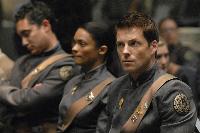 Source: The University Daily Kansan:
Source: The University Daily Kansan:Ratings for cable television show Battlestar Galactica drop as writers mix fiction with realities of war
In 2003 Battlestar Galactica, the SciFi network's most popular show, premiered and rallied instant support as a metaphor for 9/11. However, this season as the show has taken a new direction exploring the U.S. occupation of Iraq, ratings have seen a severe hit as viewers change the channel rather than be confronted with unpleasant realities of war on a Friday night.
By Patrick Ross
Monday, November 13, 2006
A furtive woman skulks into the factory with a satchel cradled in her hands. The security guard calls for her to stop and asks to look in her bag. She freezes. The guard moves toward her and she pulls a small pistol from the satchel. She shoots the guard and vaults over a railing just in time to detonate the bomb she has strapped to herself under her clothing before the other guards can reach her.
No, this isn't a scene from war-torn Iraq. It's a scene from the Oct. 13 season premiere of Battlestar Galactica.
Galactica, the SciFi network's most popular show, began in 2003 as a metaphor for 9/11 and its ratings were outstanding for a cable show. Then, at the beginning of the third season, the show's writers went in a new direction. The show became a metaphor for the U.S. occupation of Iraq and it lost viewers in droves.
Fans liked the show's original 9/11 metaphor. Man-made robots called Cylons carried out a surprise attack and destroyed civilization on humanity's 12 planetary colonies. This sent the last humans - about 50,000 people - running toward a distant safe haven. And this was good. The Cylons were al-Qaeda and Saddam Hussein. The humans were the noble Americans who struggled to make sense of the tragedy that happened so close to home.
As fans followed the human Colonial Fleet in its flight from certain destruction, they recognized parallels between the government of United States and the fictional government on the show. Both had a president who did "not negotiate with terrorists." Both had rival factions, each of which thought it knew what was best for the people. Both dealt with dissension from within.
Eventually, though, the villainous, human-looking Cylons became characters in and of themselves. The show's writers revealed them as discerning individuals with complex codes of morality that couldn't easily be dismissed as "evil," much like the Iraqi people. Fans were taken aback but gave the show some leeway because it was engaging and thoughtful.
Then the timbre of the show changed at the end of the second season. Humanity settled a new planet, not its original destination, but one capable of supporting life and providing shelter, with the investment of some hard work. And the Cylons found them.
Eight online-only, between-season "webisodes" at scifi.com and the first five episodes of season three chronicled a human "insurgency" against the Cylon force occupying the new planet. Suicide bombings, a human-staffed police force working for the Cylons and storing weapons in a religious temple topped the list of issues touched upon during the episodes.
If this sounds familiar, it should.
The premiere episode of season three lost about one million viewers compared to the premier of season two, according to tv.com. In comments in response to the Web site's article, users repeatedly criticized Galactica's tendency to "preach." Season three has continued to see falling ratings.
Unfortunately, viewers are turned off by the idea that the Cylons, once the show's terrorists and villains, are now obviously meant to represent the U.S. troops in Iraq. The humans working with the Cylons are meant to be the Iraqis seen as collaborators by their fellow citizens.
The show reminded some viewers of unpleasant realities they would rather not think about on a Friday evening. OK, there's a rising death toll in Iraq, composed of both Iraqi citizens and U.S. troops, but surely there's no place for that in what is supposed to be an enjoyable hour of television.
The majority of American young adults - those composing the largest portion of Galactica's audience - are overwhelmingly apathetic about the war in Iraq, according to abc.com. They would rather not be reminded of the "Iraq problem." For every Iraqi who wants the United States' help in Iraq, there are two who are willing to support violent opposition to the troops, according to a Sept. 27 poll conducted by the Program on International Policy Attitudes. The show's fans would rather ignore this fact, and they certainly don't need their television shows reminding them.
Americans shouldn't shy away from difficult themes in fiction. These themes should be embraced and Galactica's writers should be praised for exploring a real-world dilemma through a fictional medium. In fiction, situations can be analyzed in ways that aren't possible in the real world. Fiction can give insight into the Iraqi mind, for instance, and that shouldn't be off-putting or seem preachy to anyone who cares about understanding humanity.
Newshound: SciFi
No comments:
Post a Comment